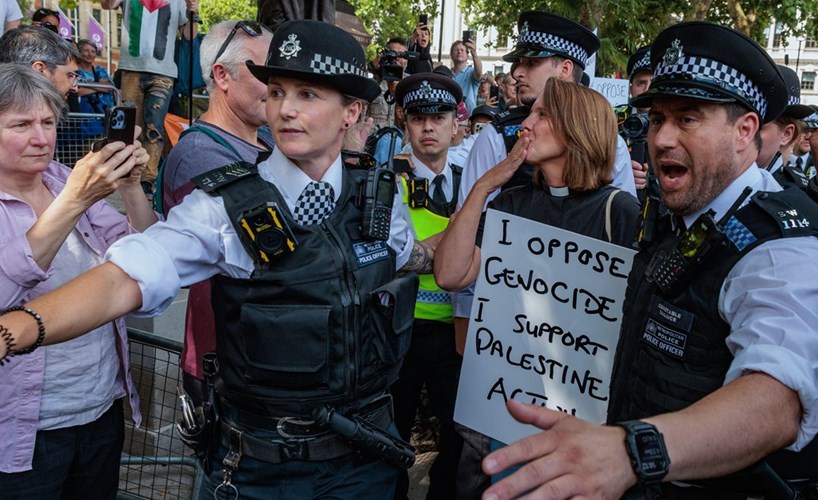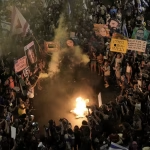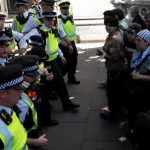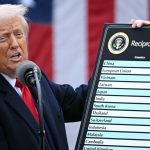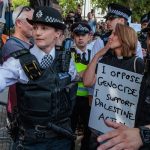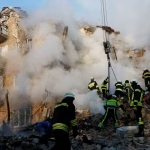The recent arrest of a Baptist minister in the United States for displaying a “Palestine Action” sign has stirred national debate over freedom of expression, religious activism, and America’s role in global conflicts. While civil liberties advocates hail the minister’s protest as an act of conscience, others argue that the action may have crossed legal or political lines. This story goes beyond a single arrest—it touches on themes of faith, justice, activism, and the boundaries of free speech.
- The Arrest That Sparked a National Debate
- Who Is the Baptist Minister?
- Understanding “Palestine Action”
- Free Speech vs. Local Law
- The Role of the Church in Social Justice
- Public Reaction
- Broader Context: Palestine and U.S. Politics
- Expert Perspectives
- The Human Element
- Potential Legal Battles Ahead
- The Bigger Picture: Religion and Political Expression
- FAQs
- Conclusion
In this article, we will unpack the case in detail, explore the historical and political context, analyze the implications for religious communities, and examine what this means for civil rights.
The Arrest That Sparked a National Debate
According to eyewitness accounts, the Baptist minister was taken into custody after he placed a large “Palestine Action” sign outside his church. The sign, painted in bold red and green lettering, called attention to what he described as “the ongoing humanitarian crisis in Gaza” and urged his congregation to stand in solidarity with Palestinians.
Police charged the minister with violating local ordinances related to unauthorized political displays. However, the arrest quickly became more than just a local incident—it drew national and even international attention. Civil liberties organizations, religious leaders, and activists began weighing in, framing the case as a litmus test for free speech and religious independence in America.
Who Is the Baptist Minister?
The minister, in his mid-50s, has served his congregation for more than two decades. Known for blending faith with social justice, he has often spoken about poverty, racial inequality, and global peace issues.
His decision to display the “Palestine Action” sign wasn’t an isolated gesture. For years, he has preached sermons linking the teachings of Christ to nonviolent resistance and the moral obligation to speak out against oppression. Congregants describe him as “a pastor who lives his values, even when it costs him.”
Understanding “Palestine Action”
The phrase “Palestine Action” is tied to a broader activist movement. Across the United States and Europe, Palestine Action groups have campaigned against what they call corporate complicity in Israel’s military operations. Their tactics include protests, boycotts, and sometimes direct action targeting companies linked to defense manufacturing.
While some view these groups as defenders of human rights, others consider them controversial due to their confrontational strategies. For a minister to embrace the phrase publicly signals a bold alignment with activism that challenges political norms.
Free Speech vs. Local Law
At the heart of this case lies a pressing question: Where is the line between free speech and violation of municipal regulations?
Local officials argue that the minister violated city ordinances by placing a large political display on church property without proper permits. They claim the issue is not about silencing speech but about enforcing rules applied equally to all organizations.
Civil liberties groups counter that the arrest represents a dangerous precedent. If a religious leader can be detained for displaying a political or humanitarian message, what does that mean for the First Amendment?
The American Civil Liberties Union (ACLU) has already indicated it may take an interest in the case, pointing out that churches have historically been spaces of political advocacy, from the abolitionist movement to the civil rights era.
The Role of the Church in Social Justice
The Baptist tradition has long included leaders who spoke out against injustice. From Martin Luther King Jr. during the civil rights movement to pastors opposing apartheid in South Africa, the pulpit has often been a place where moral conviction meets political action.
This arrest raises the question: Is today’s religious activism being criminalized?
Many religious scholars argue that the church should not be a silent observer in the face of suffering. For them, the minister’s action continues a historic legacy of faith-driven advocacy. Others, however, caution that overt political involvement can divide congregations and put churches at odds with government regulations.
Public Reaction
Public response to the arrest has been swift and divided.
Supporters of the minister argue that his arrest is a blatant attack on free speech and religious liberty. They point out that political signs are often displayed during election seasons without incident.
Critics claim the minister exploited his church platform to push a polarizing political agenda, potentially violating the separation between church and state.
On social media, the hashtag #FreeThePastor began trending within hours, with thousands of users calling for his release.
Broader Context: Palestine and U.S. Politics
The case also highlights the deep political divisions in the United States over the Israeli-Palestinian conflict.
For decades, U.S. policy has leaned heavily in support of Israel, but public opinion is shifting, especially among younger Americans. Recent polls show that more than 50% of Democrats under 35 now sympathize more with Palestinians than with Israelis.
This generational and political shift is reflected in growing protests, campus activism, and faith-based initiatives that call for a rethinking of U.S. foreign policy. The Baptist minister’s arrest, therefore, resonates far beyond his local community—it is part of a larger narrative of changing attitudes toward the conflict.
Expert Perspectives
Dr. Linda Jacobs, a professor of religious studies, noted:
“This arrest underscores the tension between religious freedom and civic regulation. When a church becomes a site of political protest, it challenges not only legal norms but also cultural expectations of what religion should be in society.”
Meanwhile, human rights advocate Omar Rahman stated:
“Silencing religious voices that call attention to injustice is dangerous. History shows us that without the church, many liberation movements would never have succeeded.”
The Human Element
For the minister’s congregation, this incident is deeply personal. Members expressed shock and sadness as they witnessed their pastor being handcuffed outside their place of worship. Some wept openly, while others vowed to continue his mission by organizing vigils and community discussions on Palestine.
One congregant said, “He told us that faith is not about comfort but about courage. Now we see him living that truth.”
Potential Legal Battles Ahead
The minister’s legal team is expected to argue that his arrest violated his First Amendment rights. They may also challenge the city ordinances themselves as being overly broad and selectively enforced.
If the case goes to trial, it could become a landmark decision on the balance between free speech, religious expression, and municipal authority. Civil rights lawyers predict it could climb all the way to federal courts, where judges will have to weigh constitutional protections against local governance powers.
The Bigger Picture: Religion and Political Expression
This case forces Americans to confront a fundamental question: Should religious leaders be free to use their platforms for political messages?
Supporters argue that faith and politics are inseparable when issues of morality and justice are at stake.
Opponents believe that political neutrality is essential for churches to maintain unity and avoid alienating members.
The Baptist minister’s arrest is not just about one sign—it’s about the role of religion in the public square.
FAQs
Why was the Baptist minister arrested?
He was arrested for displaying a “Palestine Action” sign outside his church without the required permits, which authorities claimed violated local ordinances.
What does “Palestine Action” mean?
It refers to activist movements advocating for Palestinian rights and calling for boycotts or protests against companies involved in the Israeli defense industry.
Is this a violation of free speech?
Civil liberties groups argue it is, while local officials maintain it was a matter of enforcing display regulations.
How have religious groups responded?
Many faith leaders have condemned the arrest, seeing it as an attack on religious freedom and the church’s role in promoting justice.
What could happen next legally?
The case could result in a constitutional challenge, potentially reaching higher courts if free speech and religious freedom arguments prevail.
Does this reflect changing U.S. views on Palestine?
Yes. Public opinion, especially among younger Americans, shows increasing sympathy for Palestinians, making this case symbolic of a broader political shift.
What is the significance for churches in America?
This case highlights the tension between religious expression and political activism, raising questions about how far churches can go in advocating for global or domestic causes.
Conclusion
The arrest of a Baptist minister for displaying a “Palestine Action” sign is far more than a local dispute. It is a flashpoint in ongoing debates about free speech, religious activism, and America’s stance on global conflicts.
By detaining a faith leader who sought to raise awareness about suffering abroad, authorities may have inadvertently amplified his message. Whether the courts side with the minister or the city, the case will leave a lasting mark on the conversation about civil liberties in the United States.
At its core, this story reminds us that activism often comes with a price. For this minister, the price was handcuffs. For his congregation, it is the challenge of carrying forward a mission rooted in both faith and justice.


